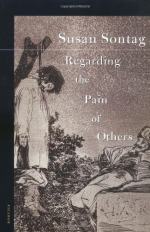
|
| Name: _________________________ | Period: ___________________ |
This quiz consists of 5 multiple choice and 5 short answer questions through Chapter 3.
Multiple Choice Questions
1. Paraphrasing Woolf, Sontag states that the privileged class fails to respond to images of war with the appropriate pain. She describes this as a:
(a) Failure to behave humanely.
(b) Failure of ignorance.
(c) Failure of wealth.
(d) Failure of empathy and imagination.
2. Sontag references an agreement in which the United States, France, Great Britain, Germany, Italy and Japan came together to renounce war. What is the name of this agreement?
(a) Kellogg-Briad Pact of 1928.
(b) The Non-Aggression Pact of 1937.
(c) The Treaty of Versailles.
(d) The Treaty of Brandenburg.
3. Which of the following magazines was NOT devoted entirely to photography?
(a) Picture Post.
(b) Life.
(c) Vu.
(d) National Geographic.
4. The protagonist of J'Accuse, the 1938 anti-war film, cries out which of the following in German and in English?
(a) "Your sacrifices were in vain!"
(b) "The horror!"
(c) "The face of war!"
(d) "War is ugly!"
5. Sontag suggests that a catastrophic event that is experienced in real life. . .
(a) "induces more stress when it is televised."
(b) "causes greater pain than one that is experienced on television."
(c) "does not often seem to be happening."
(d) "will often seem eerily like its representation."
Short Answer Questions
1. Sontag describes the way people experienced televised images of war in their own homes as which of the following?
2. Sontag mentions many factors which influence the way audiences receive war photography. Which of the following was NOT one of those factors?
3. Which antiwar book which shows images from German military archives does Sontag reference?
4. Which was the first war to be covered by television cameras?
5. The mass media bombarded viewers with shocking images because:
|
This section contains 319 words (approx. 2 pages at 300 words per page) |

|




